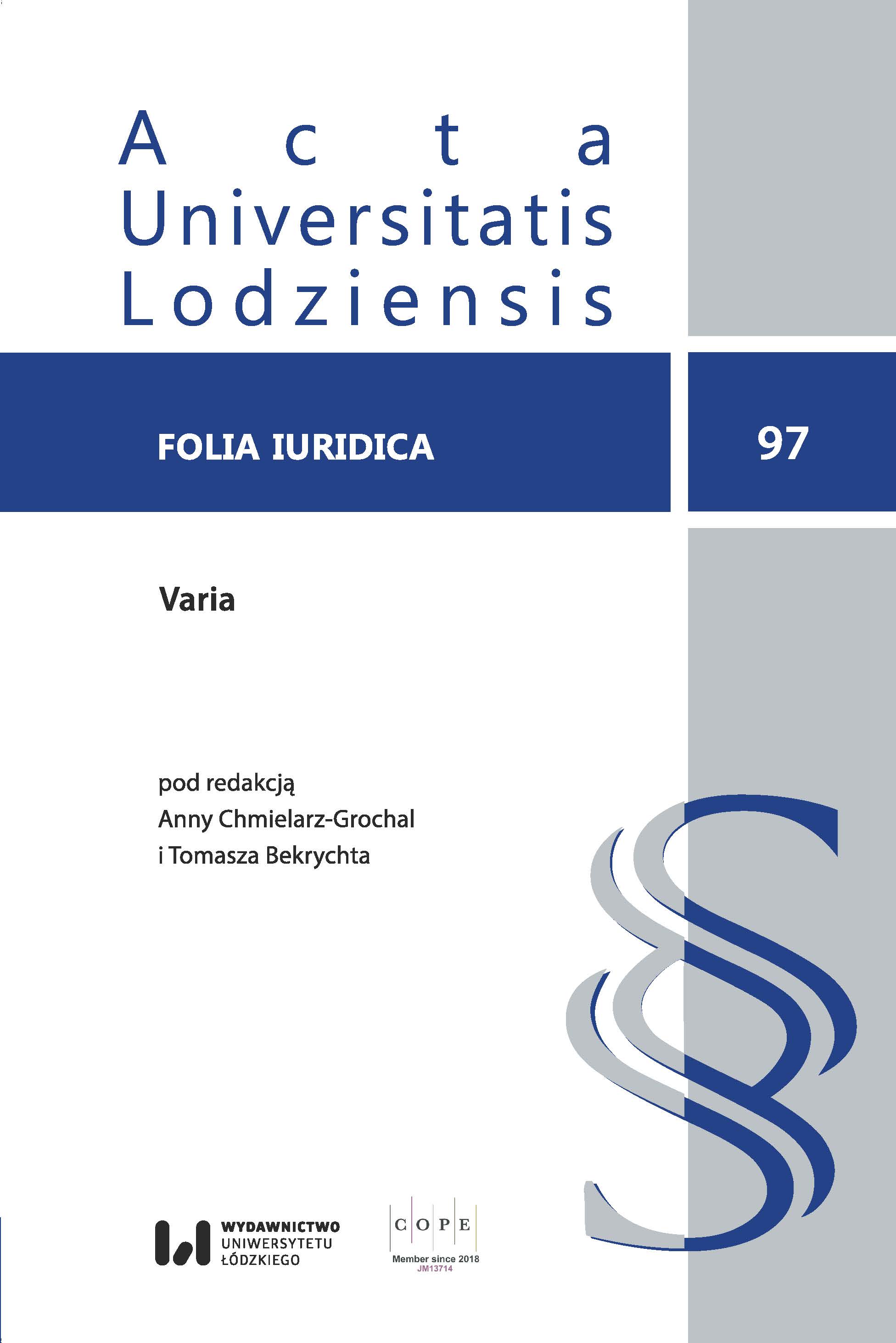The importance of the philosophy of law in judicial decision – considerations based on the philosophy of Gustav Radbruch
DOI:
https://doi.org/10.18778/0208-6069.97.11Keywords:
philosophy of law, legal positivism, doctrine of the law of nature, judicial decision, Gustav RadbruchAbstract
This article aims to discuss the influence that personal views on philosophy of law held by individual judges exerts on their judicial decisions in a connection with philosophy of Gustav Radbruch. Commonly, the subconscious philosophical position held by the judge towards the law determines the statutory interpretation and, thus, the final decision. Through the juxtaposition of Gustav Radbruch’s and Hans Kelsen’s schools of thinking, it is proven that philosophical outlook of the judges is very much relevant for the process of making judicial decisions. Lon Fuller’s notorious article “The Case of Speluncean Explorers” is used to illustrate the problem and demonstrate the causality between accepting the positivistic paradigm and the preference for formalistic interpretation of the law and, conversely, between the adherence to legal realism or naturalism and the preference for antiformalistic interpretation. Therefore, two key issues are introduced to prove the significance of philosophy of law for judicial decisions: the developments in philosophical and legal thought under the influence of law held by particular judges. historical events and the relationship between statutory interpretation and views on philosophy of law held by particular judges. historical events and the relationship between statutory interpretation and views on philosophy of
Downloads
References
Chauvin, Tatiana. 1999. „Sprawiedliwość: między celowością a bezpieczeństwem prawnym. Ewolucja poglądów Gustawa Radbrucha”. Studia Iuridica 37: 15–39.
Google Scholar
Crowe, Jonathan. 2019. „Not-so-easy cases”. Statute Law Rewiew 40(1): 79–82.
Google Scholar
DOI: https://doi.org/10.1093/slr/hmy027
Fuller, Lon Luvois. 1949. „The case of speluncean explorers”. Harvard Law Review 62(4): 616–645.
Google Scholar
DOI: https://doi.org/10.2307/1336025
Haldemann, Frank. 2005. „Gustav Radbruch vs. Hans Kelsen: A Debate on Nazi Law”. Ratio Jurisprudence 18(2): 162–178.
Google Scholar
DOI: https://doi.org/10.1111/j.1467-9337.2005.00293.x
Kelsen, Hans. 2014. Czysta teoria prawa. Warszawa: Wolters Kluwer Polska.
Google Scholar
Kosielińska-Grabowska, Urszula. 2008. „Idea sprawiedliwości u Gustawa Radbrucha”. W Rozdroża sprawiedliwości we współczesnej myśli filozoficznoprawnej. Red. Bartosz Wojciechowski, Mariusz J. Golecki. 75–96. Toruń: Wydawnictwo Adam Marszałek.
Google Scholar
Kulesza, Witold. 2013. Crimen laesea iustitiae odpowiedzialność karna sędziów i prokuratorów za zbrodnie sądowe według prawa norymberskiego, niemieckiego, austriackiego i polskiego. Łódź: Wydawnictwo Uniwersytetu Łódzkiego.
Google Scholar
DOI: https://doi.org/10.18778/7525-894-3
Kurasz, Adriana. 2007. „Czy istnieje prawo naturalne?” Studia Ełckie 9: 35–51.
Google Scholar
Lipowicz, Agata. 2009. „Formalne i materialne gwarancje niezawisłości sędziowskiej jako element systemu praworządności demokratycznej”. Homines Hominibus 5: 163–170.
Google Scholar
Łętowska, Ewa. 1993. „Dekalog dobrego sędziego”. Gazeta Wyborcza (6–7 lutego): 5–8.
Google Scholar
Paulson, Stanley L. 1994. „Lon L. Fuller, Gustav Radbruch, and the ‘positivist’ theses”. Law and Philosophy 13: 313–359.
Google Scholar
DOI: https://doi.org/10.1007/BF01001678
Radbruch, Gustav. 2009. Filozofia prawa. Warszawa: Wydawnictwo Naukowe PWN.
Google Scholar
Sanetra, Walerian. 2010. „Swoboda decyzji sędziowskiej z perspektywy Sądu Najwyższego”. W Dyskrecjonalność w prawie-materiały XVIII Ogólnopolskiego Zjazdu Katedr Teorii i Filozofii Prawa. Red. Wiesław Staśkiewicz, Tomasz Stawecki. 34–52. Warszawa: LexisNexis Polska.
Google Scholar
Widłak, Tomasz. 2016. Fuller. Sopot: Horyzonty Filozofii Prawa.
Google Scholar
Widłak, Tomasz. 2019. „Egzemplaryzm sędziowski w literaturze prawniczej na przykładzie Sprawy Grotołazów L.L. Fullera”. Prawo i literatura. Parerga. Red. Joanna Kamień, Jerzy Zajadło, Kamil Zeidler. 95–107. Gdańsk: Wydawnictwo Uniwersytetu Gdańskiego.
Google Scholar
Zajadło, Jerzy. Red. 2008. Co to są hard cases? Fascynujące ścieżki filozofii prawa. Warszawa: Wolters Kluwer Polska.
Google Scholar
Zajadło, Jerzy. 2016. Radbruch. Sopot: Horyzonty Filozofii Prawa.
Google Scholar
Zajadło, Jerzy. 2019. Minima iuridica Refleksje o pewnych (nie)oczywistościach prawniczych. Sopot: Arche, Wydawnictwo Uniwersytetu Gdańskiego.
Google Scholar
Zajadło, Jerzy. Kamil Zeidler. 2021. Fascynujące ścieżki filozofii prawa 2. Warszawa: Wolters Kluwer.
Google Scholar
Zalewska, Monika. 2015. „Czysta teoria wykładni prawa? Hans Kelsen – teoretyk i konstytucjonalista”. Wykładnia konstytucji. Inspiracje, teorie, argumenty. Red. Tomasz Stawecki, Jan Winczorek. Wolters Kluwer Polska.
Google Scholar
Zalewska, Monika. 2018. „Does Hans Kelsen’s Pure Theory of Law Support the Rule of Law and Democracy?” W Archiv fur Rechts- und Sozialphilosophie (ARSP-B) 161 The Rule of Law and Democracy. Red. Hirohide Takikawa. 203–215. Stuttgart: Franz Steiner Verlag.
Google Scholar
Zirk-Sadowski, Marek. 1998. Prawo a uczestniczenie w kulturze. Łódź: Wydawnictwo Uniwersytetu Łódzkiego.
Google Scholar
Zirk-Sadowski, Marek. 2011. Wprowadzenie do filozofii prawa. Warszawa: Wolters Kluwer.
Google Scholar
Downloads
Published
How to Cite
Issue
Section
License

This work is licensed under a Creative Commons Attribution-NonCommercial-NoDerivatives 4.0 International License.














